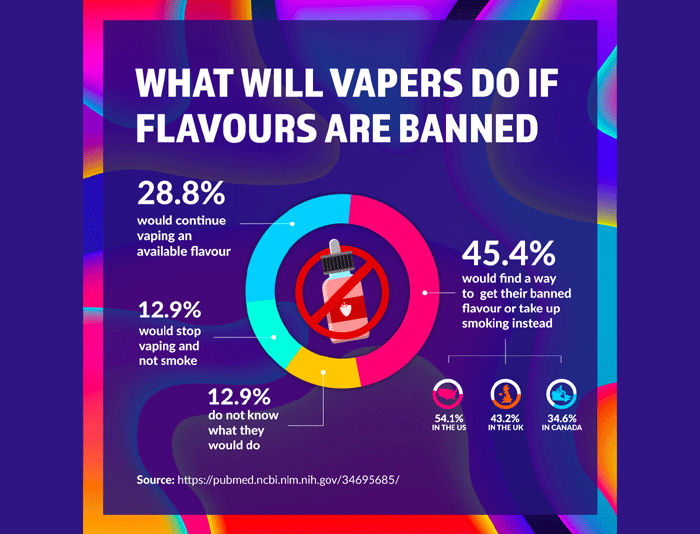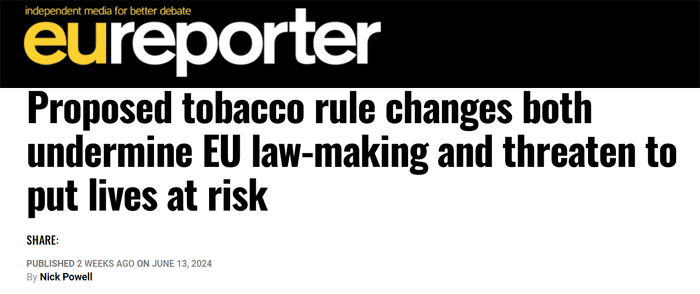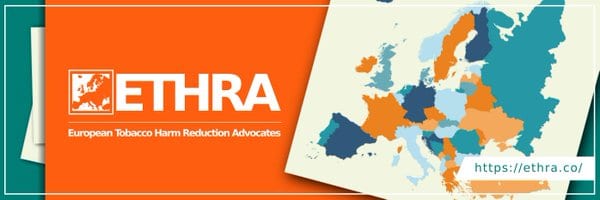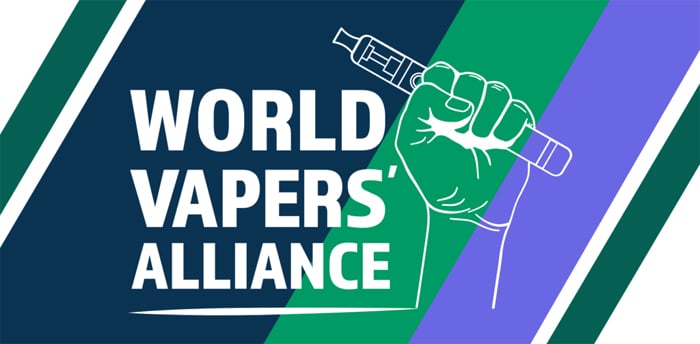We have some upsetting news as it has become apparent there is a potential EU flavour ban on the horizon.

As the UK has withdrawn from Europe this will not affect us as such but our Buddies in Ireland will be under this legislation.
Also EU law can prompt UK authorities to take similar action – and any bans may have the public asking why the UK are not following the lead.
EUTPD
This has come about due to the EU revising the EUTPD (European Tobacco Products Directive). In the UK we have our own TPD which limits nicotine strengths and tank / bottle sizes.
On the 21st June 2024) a proposed meeting of the EU health ministers was to be held and the Danish Health Minister added proposals to the agenda.
From the Eureporter article…
“The alarm was raised by the newly re-elected Swedish MEP Charlie Weimers on his first day back in Brussels. “Apparently, Denmark has opened up to a ban on the flavouring of new nicotine products, including nicotine pouches”, he tweeted. “Denmark is trying to pre-empt the Revision of the Tobacco Products Directive expected during this term”.”
Also there has not been a published report regarding the new TPD (TPD2) consultations due to a halt on some measures ahead of the European Parliament elections and appointing a new commission.
However there are talks about this “short-cutting” the usual democratic process and rushing the policy through before the present commission ends meaning there has not been the time for everyone to present their views.
“This would not be the first time the Commission has tried to short-circuit the democratic process. Courts in member states have upheld challenges to domestic legislation that transposed European directives. Judges found that they went beyond EU law in the regulation of heated tobacco products and other safer alternatives to cigarettes.”
“But even if the Commission loses when these cases eventually reach the European Court of Justice, the damage will have been done. Too many smokers will continue to use cigarettes instead of switching to devices, such as vapes and e-cigarettes that give them the nicotine they crave without inhaling the smoke that causes cancer.”
“It’s impossible not to see the fingerprints of the Commission’s Directorate-General for Health and Food Safety, DG SANTE, on the request sent by the Danish Health Minister to his EU counterparts, asking for support for radical proposals that would effectively bypass the TPD continuous evaluation process, Denmark has the worst record for reducing cigarette smoking of any Nordic country, with the percentage of the population that smokes three time higher than in neighbouring Sweden.”
Fighting Back
The excellent THR advocate Clive Bates is quoted in the Eureporter article which I will include below.

Also ETHRA and WVA have been vocal about how these measures will affect vapers.
Clive Bates
“If they think more restrictions are justified, they should be making an evidence-based case”, he told me. “That should take into account the effects on adults, the effects on young people who otherwise smoke, the effects in young people who don’t smoke and the effects of unintended consequences such as illicit trade, people mixing their own products, people going back to smoking …. It’s a much more complicated picture than they are making out.
“They are claiming gateway effects, when all the evidence points in the opposite direction -that these vaping products and other nicotine products are an exit from smoking. If you are going justify interfering in the personal behaviour of millions of Europeans, you make a better case for it.
“You shouldn’t be regulating in haste with this sort of thing, making cheap, populist gestures, when actually lives are on the line. It’s a life-or-death issue that this is done properly, and they’re treating it with a kind of flippancy. We need strong deliberative process that leads to well thought out measures to deliver for health and the internal market within the EU, not prohibitions that actually harm”.
Clive Bates was speaking to me at the Global Forum on Nicotine in Warsaw, where it was already feared that -as the organisers put it- EU bureaucrats will send millions back to smoking, with the result that the EU’s Beating Cancer Plan is unlikely to meet its aim of reducing cancer.”
ETHRA
 ETHRA (European Tobacco Harm Reduction Advocates) have published a letter to the council of the European Union – you can view it here and I have copied it below.
ETHRA (European Tobacco Harm Reduction Advocates) have published a letter to the council of the European Union – you can view it here and I have copied it below.
ETHRA Letter
ETHRA letter to the Council of the European Union
Published: 19 June 2024
On 5 June and 17 June a number of EU member states issued a call to action urging the Commission to ban flavours in consumer nicotine products. The motion was added to the agenda of a meeting of the Council of the European Union (EPSCO – Employment, Social Policy, Health and Consumer Affairs) to be discussed on June 21. Ahead of that meeting ETHRA wrote to all EU Health Ministers to highlight the serious unintended consequences a flavour ban would lead to. The letter is copied below.
We write as advocates for consumers of safer alternatives to smoking. We are aware of the forthcoming Health Ministers’ Council discussion and a call for action to protect young people from novel tobacco and nicotine products led by the government of Latvia.
We wish to urge caution and provide some factual context for the discussion. The measures proposed are unlikely to protect young people and likely to do more harm than good overall. Full or partial bans on the manufacturing and supply of novel nicotine products will not prevent the underlying demand for nicotine. All safer nicotine products are flavoured in some way (including tobacco flavour); therefore, a ban on flavourings is a de facto ban.
Prohibitions do not cause banned products to disappear or demand to dissipate. Instead, three primary responses should be expected:
- There would be an increase in smoking through reduced adult switching and increased relapse from vaping to smoking. Given the risks of smoke-free products are a small fraction of those of cigarettes and given that 700,000 people die from smoking in the European Union each year, only a slight uptick in smoking is necessary for the unintended harms to far exceed the intended benefits.
- The illicit market in banned products would flourish through informal internet commerce and multiple distribution channels to connect users and manufacturers. This market would be unregulated and attract criminal networks prepared to sell any illicit product to anyone of any age. While many products traded illegally will be high quality and manufactured legitimately outside the EU, there will be nicotine products on sale with misleading product information, safety risks and unknown potency. The main effect will be to exclude law-abiding European Union businesses from participation in a regulated market.
- Consumers and suppliers will develop potentially risky workarounds to counter intrusive regulations that prevent access to products that are far safer alternatives to smoking. There is already experience of this effect with menthol adaptations and innovation to overcome the mandated small tank and container sizes required in the Tobacco Products Directive. In the future, consumers may be pressured to mix their own flavoured liquids and sell them to others, possibly adding dangerous ingredients and mixing them in unhygienic conditions.
These effects will apply to young people and adults alike. There are further risks to young people if they are drawn into illegal supply (a common practice in illegal drug networks) or manufacturing (making liquids for friends to earn money).
We agree that young people should not use nicotine. However, we are concerned about measures that would address this challenge by removing choices from the much larger adult population of nicotine users (there are typically 10-20 times more adult nicotine users in most countries), most of whom are at risk from smoking. It is also essential to understand that most forms of nicotine use by teenagers may be experimental and short-lived, with minimal consequences. However, adults who switch from smoking to safer, smoke-free nicotine products will experience dramatic reductions in their exposure to harmful toxicants. The European Union should not be obstructing such moves but encouraging the transition to safer nicotine products as part of its efforts to beat cancer and address non-communicable diseases.
We support a proportionally regulated market for safer nicotine products, which aims to achieve a high level of health and consumer protection with minimal acceptable risk. That means doing everything possible to migrate smokers to smoke-free alternatives. This aim will not be achieved with prohibitions.
We agree that there should be efforts to reduce youth access to all nicotine products. These break down into four main areas:
- A lawful regulated market. Maintaining a legal market in the products that adults legitimately wish to buy is essential. Prohibitions will lead to unregulated markets with no controls and elevated risks to adults and youth. There is no logic to prohibiting safer nicotine products while cigarettes are pervasively available and by far the most dangerous products.
- Age-secure retailing. It should be straightforward for adults to buy the products they want but difficult for those deemed to be underage. Licensing regimes, identification systems and other options exist to support age-secure retailing.
- Marketing controls. We recommend controlling advertising, promotion, and sponsorship to prevent irresponsible and youth-oriented marketing. These controls should be extended to controls on packaging and branding, including the descriptors used for flavours (see below).
- Control of flavour descriptors. A flavour can be understood in three ways: (i) a chemical recipe, (ii) a sensory experience (e.g. “apple” or “vanilla”), and (iii) a descriptor (the words used to describe the sensory experience). It is legitimate to control the chemicals used to avoid toxic risks. Controls on flavour descriptors as a form of marketing are justified. But we do not advise broad prohibitions of flavour as a sensory experience.
However, any excessive control on the supply and marketing of safer alternatives to smoking works against the aims of the internal market, forming a barrier to entry that suppresses pro-health, pro-consumer innovation while protecting the incumbent cigarette trade.
We hope that further revisions of the Tobacco Products Directive, Tobacco Advertising Directive and Tobacco Excise Directive will be based on evidence, deliberation and meaningful consultation. These are important directives that can have lethal or life-saving consequences for European citizens. We should not begin their revision with pre-ordained results that are based on weak or misleading evidence.
ETHRA remains at your disposal and would be delighted to supply any further information which you might require. We look forward to hearing from you.
Yours sincerely,
Damian Sweeney
On behalf of ETHRA & Partners
WVA
 The WVA (World Vapers’ Alliance) sent out the email campaign which I have copied and pasted below which also ties in with their #FlavoursMatter campaign.
The WVA (World Vapers’ Alliance) sent out the email campaign which I have copied and pasted below which also ties in with their #FlavoursMatter campaign.
Also they have written to the EU health ministers in an open letter which you can read here.
WVA Campaign
Hello Vapers Family,
Mariam here, 
Today I need to share something urgent with you:
54,000 voices are demanding a NO vote on a potential EU flavour ban! Ignoring public opinion and science puts lives at risk. EU Health Ministers, it’s time to prioritize harm reduction and protect public health. Listen to the people you serve! #FlavoursMatter
On June 21, EU health ministers will meet to discuss a last-minute proposal by the Danish Health Minister that could disrupt the EU’s law-making process. This proposal threatens to ban our favourite flavours. This move could deny smokers the safer alternatives they need to quit cigarettes, which continue to harm the health and lives of too many Europeans.
Swedish MEP Charlie Weimers has raised the alarm, highlighting that Denmark is trying to pre-empt the Revision of the Tobacco Products Directive. The European Commission has failed to publish a report on the public consultation about a new Tobacco Products Directive (TPD), and now there’s an attempt to push through the flavour ban.
If this proposal goes through, it could have severe consequences, pushing more people back to smoking instead of using safer alternatives.
We need to act now! Help us spread the word by sharing this tweet or writing to your health minister. Tell them your story and how vaping and flavours helped you!
Urgent: 54,000 voices are demanding a NO vote on the flavour ban! Ignoring public opinion and science puts lives at risk. EU Health Ministers, it’s time to prioritize harm reduction and protect public health. Listen to the people you serve! #FlavoursMatter pic.twitter.com/6iPpfa74V8
— World Vapers’ Alliance (@vapers_alliance) June 18, 2024
WVA Press Release
FOR IMMEDIATE RELEASE
54,000 Voices Ignored: EU Health Ministers’ Flavour Ban Push Threatens Public Health and Democracy
Brussels, 19.06.2024 – Vapers across Europe have raised the alarm before the EPSCO Council meeting on Thursday, where Ministers will make aggressive push to ban flavours in safer nicotine products.
This move bypasses democratic processes and disregards the voices of 54,000 citizens who have signed a petition against such a ban organised by the World Vapers’ Alliance (WVA).
“Every year, 700,000 lives are needlessly lost in the EU due to smoking-related diseases. By recklessly pushing for a flavour ban on safer nicotine alternatives, they are playing with lives and ignoring the clear will of the people. It’s time to stop this madness and listen to science and the citizens they serve,” said Michael Landl, Director of the World Vapers Alliance.
The European Commission has yet to consult the public on a new Tobacco Products Directive (TPD). This delay has left a void that Ministers aim to exploit, sidelining the necessary scientific evaluation, public consultation, and parliamentary scrutiny.
Record numbers of submissions marked the European Commission’s initial Consultation, primarily from citizens supporting safer nicotine products.
Flavours play a significant role in helping adult smokers transition away from cigarettes and maintain abstinence from smoking. Ignoring this fact endangers public health and disregards the overwhelming support from European citizens who have voiced their opposition to a flavour ban.
The WVA calls in an open letter on EU Health Ministers to reject the flavour ban proposal and instead focus on policies that are informed by science and reflect the will of the people. As the next iteration of the Tobacco Products Directive is considered, it is imperative that EU policymakers recognise the importance of alternative products in reducing smoking rates and protecting public health. “This isn’t just about regulation, it’s about lives. We must prioritise harm reduction and listen to the voices of the people,” added Landl.
ENDS
What Can We Do?
As you can see above the WVA and ETHRA have campaigns running so please join in and add your signature.
Also share social media posts and use hashtags such as #FlavoursMatter.
The post Potential EU Flavour Ban? appeared first on Ecigclick.






